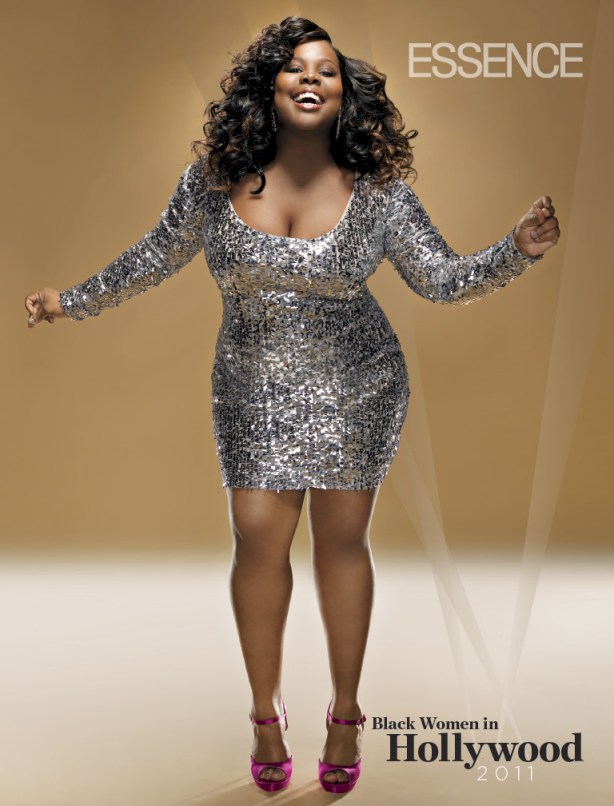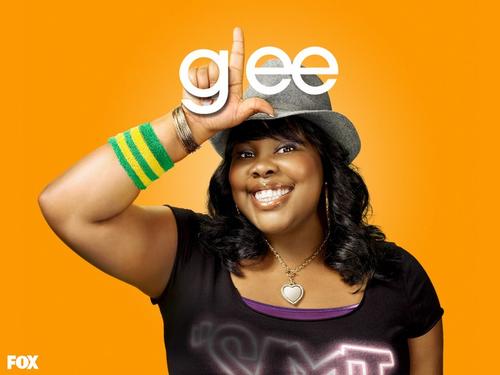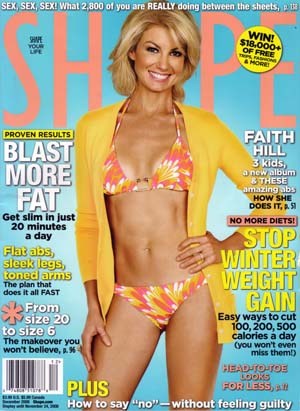In an interview for the MTV series This Is How I Made It, actress Amber Riley, who plays Mercedes on Glee, started crying when she spoke about her struggles feeling accepted in Hollywood.
“Hollywood is a very hard place to be in. It really is. Being the person I am, you know, the size I am, being a woman, being a black woman, there’s not a lot of roles for us.”

Before the role of Mercedes came along, casting agents told Riley she would be perfect if she just lost a little weight, or they offered her roles like “the girl who committed suicide because she was fat” and “the girl who sits in the corner who eats all day,” which she didn’t want to accept for obvious reasons. A recent Wall Street Journal article by Roxanne Gay points to the increasing visibility of plus-size women in film and television; but unfortunately, it’s often the actress’s weight, not the actress herself, who gets the real role. In Bridesmaids, all the jokes written for Melissa McCarthy’s character Megan, revolve around her weight . Her hypersexuality is supposed to be funny because it rests on the presumption that bigger women aren’t sexual and the comedic effect of her “butchness” is grounded primarily in her size.
The article also mentions the character of “Fat Amy” in Pitch Perfect. Although going by “Fat Amy” is the character’s choice (so “twig bitches” don’t call her fat when she’s not around), it’s still worth noting that her size is still a part of the plot — it can’t just go unmentioned:
“Overweight actresses are routinely constrained to roles and plots that make their body a focal point and, more often than not, a source of ridicule or humiliation. They are always considered overweight long before they are considered women. The constancy of this erasure is telling.”
Though Amber Riley sees her role on Glee as one of the better ones that she’s been offered, I wondered if her size means that just like Megan and Fat Amy, Mercedes is treated differently from the other characters on the show. Having watched a grand total of five Glee episodes, I decided to ask a former Gleek, my friend Grace who ended an intense relationship with Glee after what she describes as the disastrous season 3.
Grace says, “Mercedes was given few episodes or storylines that centered around her, despite being on the show since the beginning and singing a large number of songs. Often, when there actually was an episode about Mercedes, it involved food: Home in which Mercedes is told to go on a diet to prepare for a magazine interview, and The Substitite which sees Mercedes protesting the ban of tater tots in school.”
There’s also the fact that for the first two seasons, Mercedes remained the only main character without much of a romantic life. “She was painted as non-sexual,” Grace says, and Jezebel agrees, quoting XHIBIT P’s Lana Frater who thinks it’s because of her size and compares the treatment of Mercedes to that of Coach Beiste:
“Mercedes and Shannon [Beiste] represent the non-sexual fat woman. Amber Riley, who plays Mercedes, has an incredible voice — arguably the best — but can’t get a date or love interest to save her life. As a character, Mercedes has yet to be developed. Unlike her voice, Mercedes’ character is lackluster. Two seasons have come and gone, yet Mercedes remains the same character whereas other main characters such as Finn, Rachel, Quinn, Kurt, Brittany, Artie, Tina, Santana, even mean Sue Sylvester have changed and grown. Like many fat woman in TV and movies, Amber plays the supporting character, never the main, despite being a regular on the show.”
Though in later seasons Mercedes is given love interests, it doesn’t change the fact that for two whole seasons Grace explains that “she was denied the same level of romantic interactions as her peers on the show. The character herself often complained about not being appreciated or seen as equal to other Glee club members.”
Last week on The Ricki Lake Show, Riley talked about how her size has always been a focal point in the roles she gets. In her first acting job ever as an eight year old, she was cast as “the plus-size girl.” As an eight-year-old who was super happy to finally have an acting job, she was too excited to think about the implications of Hollywood labelling children and categorizing them according to their weight; but as an adult, the 26-year-old Riley told MTV, “I never wanted to play a character that hated herself. I wanted people to know that those aren’t the only roles for people like me, normal girls.”
Hollywood needs to learn that normal girls come in all shapes and sizes — you shouldn’t have to fit into a certain size of jeans to play a romantic lead. But in fighting against the assumption that plus-size women aren’t normal, I’m noticing a disturbing trend – a skinny/fat dichotomy that isn’t doing any woman any favours — which is why I was disappointed when, in her interview with the actress, Ricki Lake called Amber Riley “a real woman.” What does that mean exactly? That if you’re thin, you’re a “fake woman?” Calling bigger women “real women” under the guise of promoting body image acceptance only contributes to the problem of placing value on and making assumptions about a woman based on her size.
“I’m a healthy person,” Riley says. “I have great friends around me who are positive.” I like the idea of focusing on having healthy lives, not how we look living them; but unfortunately even the idea of health has been warped my the mainstream media to promote body shame. So many women’s fitness magazines define “health” as losing 10 pounds or fitting into your “skinny jeans.” There have been times in my life when I have started a workout program hoping to achieve certain “results,” look a certain way. I never finish these workout programs and end up feeling depressed and discouraged that my body isn’t suddenly morphing itself into some beauty standard that isn’t even mine to begin with. But when I exercise knowing that I don’t need to look a certain way or to change, that I only want to build on the wonderfulness that is my body as-is, then before I know it, I’m running faster and longer, lifting heavier things, and feeling happy knowing I can kick anyone’s ass who dares to define my body, your body, or Amber Riley’s body according to anyone’s standards but our own.
As Amber Riley says, “there is no set rule, no set look, no set anything. You make your own rules in life, and your own decisions.”











Comments
Yes all of this! and as a naturally slender person, I appreciate you addressing the “real woman” comment. I can’t gain weight if I try, and while thinness is idealized by our culture, I feel like there are also a lot of things telling me there’s something wrong with me for being the way I am (“real” women have curves, etc). Real women are all types of women! Basically what you said: “I like the idea of focusing on having healthy lives, not how we look living them”
“…which is why I was disappointed when, in her interview with the actress, Ricki Lake called Amber Riley “a real woman.” What does that mean exactly? That if you’re thin, you’re a “fake woman?” Calling bigger women “real women” under the guise of promoting body image acceptance only contributes to the problem of placing value on and making assumptions about a woman based on her size.”
THIS. yes. I cringe when I hear lines like “real women have curves” or “I like a woman with something to hold onto” because what the actual fuck, I have zero curves and not much else to “hold on to” whatever the hell that’s supposed to mean. (Apparently you either have curves or you’re a phantom, slip right through the fingers! Nobody can hold on to you!) And if I’m not a real woman…(I’m a lesbian and I have no curves, so I feel like this is doubly true, right?) So I’m a fake woman? What even IS that?!
It is not anyone’s place to put a value on the shape, color, size, insert-characteristic-here of anyone else’s body and damnit if you don’t have anything nice to say then get in the hall! I’m so sick of hearing about too big or too small. That’s not the important part. and the solution is right in your title. stop criticizing bodies, actually can we just kind of stop talking about how bodies look and talk about what they DO instead? because I think they “look” part is beside the point. would I stop drinking orange gatorade if the bottle was too curvy or not curvy enough? No. Because it’s freaking delicious. I think I’ve made my point. women = Gatorade, let’s stfu and drink.
I agree with this so much.
F’reals. I heard it so much as a kid that I went through a phase where I would way overeat really shitty food constantly (6 meals a day, hello!) for the sake of “gaining weight.” Never happened, but I really unhealthy from the crap I ate all the time.
Now I just have 6 meals a day for funsies and deliciousness. One day, I’ll even exercise..
Preach.
I agree with everything in this article, including your Gleek friend’s description of season 3 as “disastrous” (I have not broken my co-dependent relationship yet– more power to ya girl). But the article is missing everything about season 3, which did include Mercedes in relationships– two, one a football player, and the other another Glee member. It was a strained storyline but it ran the entire season, the tension between Mercedes’ wanting to be with Sam but not wanting to leave her football boyfriend (evidently they had a summer fling– there’s even a song devoted to it! A very bad rendition of “Summer Nights” of course).
This article only makes me wonder if there was pressure to change the perception of Mercedes as non-sexual and if so, where it came from and why. So while I think everything is true, it stops far short of examining the current sexual space that the character Mercedes occupies — and that her weight is never mentioned in that context.
(also, she has much more substantial singing roles on Season 3, as does Santana which was AWESOME, of course).
Excuse,that rendition of ”Summer Nights” as well ”Samcedes” ”Human Nature” duet was good thank you. But,yes Amber Riley [Mercedes] did get more songs and scene time in season 3. But,she still deserves soo much more and her talent is worth soo much more than what ”RIB” and ”Glee” writers give her ”Fact”! Nothing, Amber Riley ever sings or is apart of is bad.
Yes, those other two were good, def. I just thought the storyline was strained, I never really understood it because it all took place over the summer so we didn’t get to see its development, only its pained wavering. (Should she? Should she not? He has trout lips after all– but is that a good or bad thing?)
But omgeeeez the Troubletones were gleetastic! Everything they did– the Adele mashup especially was incredible (umm, particularly Santana’s pained expressions at Brittany). So, agree to disagree on “Summer Nights” (the dancing was good, I’ll admit that) but everything the Troubletones did was stellar.
And that is some real Gleekspeak there. I’ll stop now.
The Troubletones were basically the best thing Glee ever did.
#Dead he has trout lips…… Poor,”Trouty Mouth”! I don’t know,if it’s a good or bad thing. But,Mercedes and the rest of Sam ex’s likes or liked his lips tho! And,yes ”Samcedes” relationship I enjoyed and if ”RIB” were smart they would be back together. The ”Troulbeones” numbers & Santana coming out was the best thing about season 3. And,Finally Mercedes stood up for herself and went for her’s.
Awesome article. Thanks for calling out Bridesmaids for that as well. I think Melissa McCarthy is a great actress, so I was frustrated that the role relied on problematic stereotypes to make her character funny.
Quick correction: Melissa McCarthy’s character in Bridesmaids was actually Megan, not Molly. She plays the co-lead in the show Mike and Molly. http://www.imdb.com/title/tt1478338/fullcredits#cast
fixed! :) thank you
“In Bridesmaids, all the jokes written for Melissa McCarthy’s character Molly, revolve around her weight.”
I agree when it comes to her hypersexuality that it’s predicated on the idea that big women aren’t sexual, but I don’t know if I agree that ALL the jokes revolve around her weight. A good number of them also revolve around the fact that she’s really frickin’ weird, like when she suggests having a Fight Club themed bridal shower or when she first meets Annie and begins by telling her about an awful injury she had.
Despite the fact that many of her jokes were problematic and/or fat-centric, I LOVED Melissa McCarthy in Bridesmaids. She owned that role 100% and turned it into something greater than the sum of its parts. I’ve loved her since Gilmore Girls, and she absolutely *made* Bridesmaids for me, no question. She stole every scene she was in.
Anyway, great article! Sorry for that embarrassing outburst of Melissa McCarthy fan-love.
That whole thing where she kept insisting that the guy on the plane must be an air marshal had me dying… and then when she [SPOILER ALERT] turned out to be right I was like “YES!”
I know this shouldn’t be my focus because this article was awesome!
BUT…the van full of puppies!!! Best part of that damn movie.
True the van full of puppies soo funny! And,Melissa McCarthy stole the show in Bridesmaids.
I love Amber Riley,can’t wait for her debut album to come out! I see her having a legendary music career with the likes of Aretha,Whitney,Mariah…… That’s how talented,Amber Riley is! And,she don’t have to change especially for ”Hollywood” or anybody else!
and real talk, where I’m from, a woman like Amber Riley would be getting love from all sides of the hot people spectrum. sometimes i feel like teevee is the only place a thicker chick doesn’t get love.
the same people writing characters like Mercedes as non-sexual or putting butch chicks in non-sexy situations are the same drunk dumb f*cks trying to get us to bang them in bathrooms while their trophy wives are outside smoking cigarettes. wait, maybe that was just a tv wrap party i was at BUT STILL.
what people say isn’t sexy in front of others is secretly what they deny themselves the pleasure of enjoying.
but real women of all sizes, presentations etc etc don’t need those down low a-holes, just come find me. haha. nah just do you like the picture says.
I like everything about this comment.
Truth! But,see most of if not all her male cast mates have a crush on her Cory Monteith [Finn] has admitted at least twice in two separate interviews to having a crush on her and especially Kevin Mchale [Artie] stay hitting on Amber all on twitter,interviews etc…. He really is in love with her,but Amber ain’t giving him the time of day ha! But,leave it to t.v. & the ”Glee” fandom are the worst! Which I’m not apart of I’m only a Amber Riley fan! Those who aren’t ”Samcedes” fans seem to think Sam would never go for ”A Girl Like Mercedes”……. #Really Relationships like Sam & Mercedes do happen in real life!
Comments like this are just one more reason I adore you.
Gabrielle, I mos def co-sign to your statement. Where I’m from, Amber’s weight wouldn’t even be an issue. Sista would get love from erry’body!
I’ve always felt like tv, magazines, Hollywood, etc can mess with a person’s self esteem. It’s entertainment that tells us what is beautiful and that is something that we have to fight against…. I think that overall, you have to continue to love yourself no matter what and not succumb to what outsiders define as beautiful. I’m happy that Amber loves herself and surrounds herself with folks who love and appreciate who she is because it is definitely needed to make it, not just in Hollywood but anywhere.
*sidenote, Amber’s character on Glee should have been given more of the limelight. Not only is she a good actress but a really great singer. I liked her more then Rachel.
Preach!
All of this…oh how RIB needs to read this article. But they probably won’t change a thing..and yes she finally was involved in a relationship in season 3 but what happened to that???…RIB ruined it and we’re back to square one where Mercedes character has nobody.
Because we are in season 4 which can’t seem to decide if it wants to/can let go of the seniors who graduated or not. Mercedes’ character is doing awesome in LA, working and going to school. So how exactly does she make it to Lima, Ohio to work on the musical. Who knows but why not throw a love interest for her in too, everyone else seems still hung up on theirs.
Oh wait, I said I would stop.
I think that it’s gross that characters like Megan from “Bridesmaids” or Fat Amy from “Pitch Perfect” can never be sexual – and if they are, it’s only because it’s supposedly funny – but I also wouldn’t want people to ignore their weight or for them to feel like it shouldn’t be addressed. Not that this is where 100% of the jokes surrounding their characters should be coming from, but I’m not going to write off a fat character because a few of the jokes and gags they’re involved in are about their size. As a bigger person who got through high school unscathed by making fun of my weight before anyone else could, and who wants to work in the comedy industry, I think it’s nice to see some new comedic female stars rising in the ranks – like Melissa McCarthy and Rebel Wilson – and that they can acknowledge their size and be comfortable in their skin and funny and dynamic on screen despite all that. It’s even nicer to see people talking about how funny they are and sometimes how nice they look before they talk about their weight. Admittedly, I might excuse a lot of things simply because I’m overwhelmed at just how awesome it is to even see them onscreen and getting accolades.
Speaking of nice things, it’s nice to see Roxane Gay get some love because she is awesome and I had dinner with her once.
Uh this makes me so sad that this shit even happens. Amber freakin rules, her voice is AH-MAZING and she doesn’t deserve to be treated different because she’s curvy. I remember watching Glee early on, wishing that Amber got more screen time and more singing time, like she had so much awesome that was being held back. STUPID.
Also, the “real woman” line… I think that fat positivity awareness is increasing but the media & the general public are SLOW to pick it up, so they think they are being empowering when they say “real women” I mean it used to be a whole lot worse, before those Dove ads existed I’ve never heard people stick up for curvy bodies before. I know that there will be a shift eventually, where ALL bodies are real bodies.
I will never understand how Hollywood (and a whole lotta stupid ass folks) continue to miss the mark on what makes a woman beautiful. Oh the wonders I’d have missed were I so blind and stupid. Women, all women, are beautiful.
Although I’m Jewish and love seeing the JAP action that is Rachel’s character (*eye roll*) I never really understood why everyone talked about her as having the best voice. Mercedes clearly does. Although Santana is actually my favourite in terms of sound/style- I love deep, gravelly, female singers.
On the body stuff, I don’t have much to add to what everyone has already said- except I think that when people talk about women having curves or something to hold onto, they’re talking about ‘good’ curves. In the ‘right’ places. Well sod that for a game of soldiers.
Oh *and* I think the humour in Bridesmaid’s Megan’s sexuality is not just because she’s fat (although that is probably part of it) but also that she’s a woman. And you know, women aren’t supposed to do that. Notice none of the other characters are actively seeking sex from any of the men, so you throw in a sexually aggressive one and the contrast is funny. Annie, Rita, and the squeaky one I’ve forgotten the name of all describe/show sex lives in which they are passive/coerced into something they don’t want.
The real humour/tragedy in Megan is that she is active in seeking her pleasure. It’s humourous because that’s what we’re told women aren’t supposed to do. And it’s tragic for the same reason.
This is exactly what I hated about the character: By making Magan fat, weird, butch-ish – witch are all traits that equals “ugly” by Hollywood standards – the movie painted a sexually initiative woman as unattractive/ non desirable and played female sexuality for laughs. Whereas in reality you end up with hotties like Sinclair Sexsmith when you combine “female” + “butch” + “heavy” + “sex” Hollywood still thinks everything besides the narrow standards of the beauty industry and gender norms m-u-s-t be ridiculous.
I just want to thank you for writing this article because this is something I don’t really think about in my day-to-day life. It’s opened my eyes much more and made me think.
Especially the part about ‘real women have curves.’ I never would have thought about it to be honest but now I’ve read this it’ll stand out much more to me. It made me realise that women do come in all shapes and sizes and that as long as you are healthy fuck what everyone else thinks/says.
So thank you.
I agree with all the things said about Mercedes’ storyline on Glee, and the comparison with Coach Beiste, but it should be noted that Puck’s S2 girlfriend Lauren was fat and gave no fucks, and he loved her for it. Obv the storyline wasn’t perfect – she was almost always shown eating/talking about food – but she never apologised for who she was or got storylines about dieting, so there’s that? Also also, Puck dated Mercedes in an ep of S1, even though it was mostly a popularity thing b/c she was a Cheerio at the time.
(Wow I did not know I still remembered all that about Glee.)
And while I’m here, YES to calling bullshit on the “real women have curves” thing. As a girl stuck somewhere between built-like-a-rectangle and just-enough-boobs-to-want-a-bra, I always hated the phrase.
“There have been times in my life when I have started a workout program hoping to achieve certain “results,” look a certain way. I never finish these workout programs and end up feeling depressed and discouraged that my body isn’t suddenly morphing itself into some beauty standard that isn’t even mine to begin with. But when I exercise knowing that I don’t need to look a certain way or to change, that I only want to build on the wonderfulness that is my body as-is, then before I know it, I’m running faster and longer, lifting heavier things, and feeling happy knowing I can kick anyone’s ass who dares to define my body, your body, or Amber Riley’s body according to anyone’s standards but our own.”
At almost 26, this is something I finally understand. What started as anorexia in my late teens turned into a crushing form of binge eating disorder by the time I was halfway through my first year of university, and would continue to rule my life into my mid-20s. Disgusted with my weight gain, I swore off romance, having fun, etc. telling myself that when I lost the weight, I’d finally be “perfect”. I’d finally love myself again.
I’ve learned that it doesn’t work that way. You need to love yourself first, and understand that you are beautiful the way you are, and THAT’S why you deserve to live a healthy lifestyle that makes you feel and look good. Wanting to lose weight is fine, but you have to be comfortable with yourself first, rather than tell yourself you need to lose weight because you look terrible as you are, and that reaching that magic number will suddenly turn you into a goddess.
I feel the best I’ve felt in years right now. I haven’t binged since August, and put more emphasis on eating foods that are good for me, rather than those which will help me lose weight faster. I go running now, do yoga, and love the defined arms and firm glutes I’m developing. I notice my body getting stronger, that push-ups and planks are getting easier, and it gives me a rush! I’m setting more realistic weight loss goals for myself, ones that allow me to indulge in some white chocolate-covered peppermint Rold Gold pretzels (bought a bag on Monday, SO GOOD!) once in a while.
your story just made me smile like a million bucks. thank you for sharing. <3
In general, I think we make the world a better place by avoiding body-related comments period. I’ve seen a lot of remarks which were supposedly intended as compliments “oh, you’re so curvy” “oh, I wish I had a big booty like yours” and the one I get all the time “oh, you’re soooo tall.” Personally, I’ve had it with good intentions, if you don’t really explicitly know how the person feels about what it is you’re supposedly commenting on, then JUST DON’T SAY IT. Not every woman wants to be reminded she’s thin, a large chest, a big butt or is tall. Just because you think it should be a positive doesn’t mean the person whose body is so often defined by it feels that way.
This all also relates to being trans and having people saying things like “oh, but you don’t look trans” “oh, but you’re actually pretty” “oh, I’d never know you weren’t always a woman.” Gee thanks… I know, intentions are magic and your intentions override my lifelong feelings about my body. You get a golden ticket to say what you want. *sarcasm over* :(
I always, always, always get the “Oh, you’re so tall” comment, and it’s awkward just because I have yet to master a decent-sounding reply. Saying “thank you” feels strange because I don’t consider being tall something to be super thankful or not thankful about – it just is. Other replies that come to mind (but that I can’t say) include, “I know (I’m tall)” and “Oh, you’re so short!”
I seriously hate the ‘skinny = healthy’ mindset. I’m very overweight because I overindulge in food and dont exercise enough, and my friend is very underweight because she’s got a chronic lack of appetite and finds it hard to keep food down unless shes stoned, but is also super lazy and unfit, drinks coke like its water and what she does eat is usually junk food. As she was ranting the other day, people would look at us and say I’m the unhealthy one and never comment about her, even though we’re both unhealthy. My cousin is also at the lower end of her healthy bmi range but maintains it by starving all day and then eating crap. So when people tell fat girls they’re “just concerned about your health” its total bullshit, all you want is for everyone to fit your definition of attractive.
When I’m stressed, depressed or overwhelmed I lose interest in food, have difficulty eating and lose weight really quickly. And then I get lots of compliments and people asking me how I did it. Yuck yuck yuck. I associate being thin with the worst times in my adult life, and with the times as a child when I was told by other girls that they hated me because I was skinny. So I hate it when people tell me I’m skinny or thin… it makes me feel guilty and vulnerable.
Yes! I see so many people using the term ‘real women’ to describe women who don’t exactly fit in with society’s beauty standards and it always annoyed me but I couldn’t put it into words! Thankyou for articulating my feelings into coherent speech! It’s good to know other people are picking up on this.
People talk so much about how we need to get more ‘real women’ in advertising- as if the current models are holograms??? What this does is polarise one shape as ‘fantasy’ and another as ‘reality’. The last thing we need is to sort women into the categories of ‘skinny’ or ‘not skinny’. We need to represent the wonderful variety of beautiful shapes and sizes of women, none of which is more ‘real’ than any other.
Did that make sense?
I agree that it’s problematic to say that “real women have curves”. Personally, I think all women are beautiful…but then again, I’m an Autostraddle user, soooo I don’t know what else you’d expect :P
although I wonder if Ricki Lake’s comment was meant to say that Amber, by not fitting under the impossible beauty standards that Hollywood creates, is a “real woman” because she, like basically every other woman in the world, is *not* what Hollywood would deem perfect
so I wonder if maybe you could say that a woman with a big nose or acne or frizzy hair is a “real woman” for the same reason without necessarily implying that women with small noses, clear skin, and straight hair are “fake women”, because if we were to use this definition then it would be inclusive of all women
I don’t necessarily think that this is what Ricki meant, since I haven’t seen the interview in its full context, but I think it is possible to use the term “real women” so long as you’re not singling out certain women as “fake” for not having these traits that are perceived as flaws
I just went to the doctor yesterday and learned my BMI for the first time. I’d never known my BMI before because I was above all of that, because I know it’s just a number, but now that I know the number it’s like I can’t un-know it. It sucked to learn that I’m actually considered obese by the medical industry’s standards. I just feel really gross. And of course the doctor was after me about losing weight. This article helped out some, so thanks.
Also, Amber Riley is an awesome singer – she should have a solo career.
Amber Riley is amazing. From her voice to her appearence, its a shame that most people think you have to be thin to be beautiful.